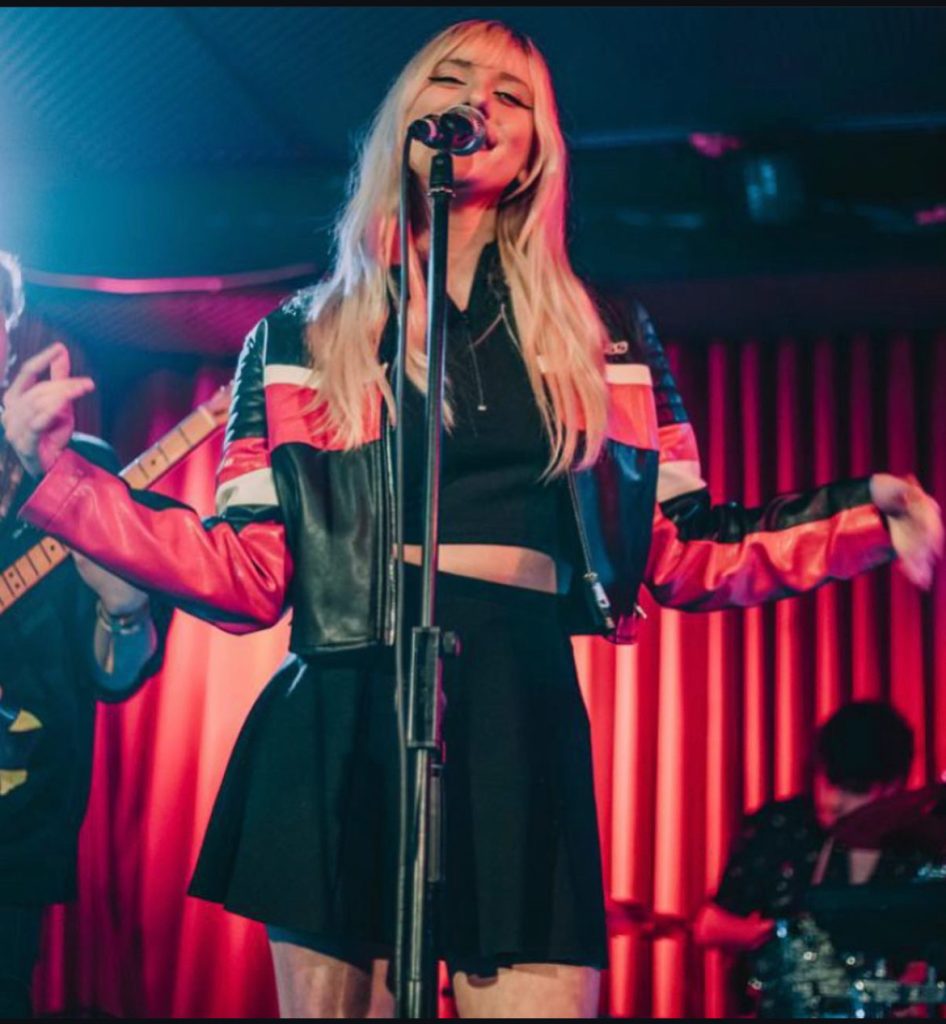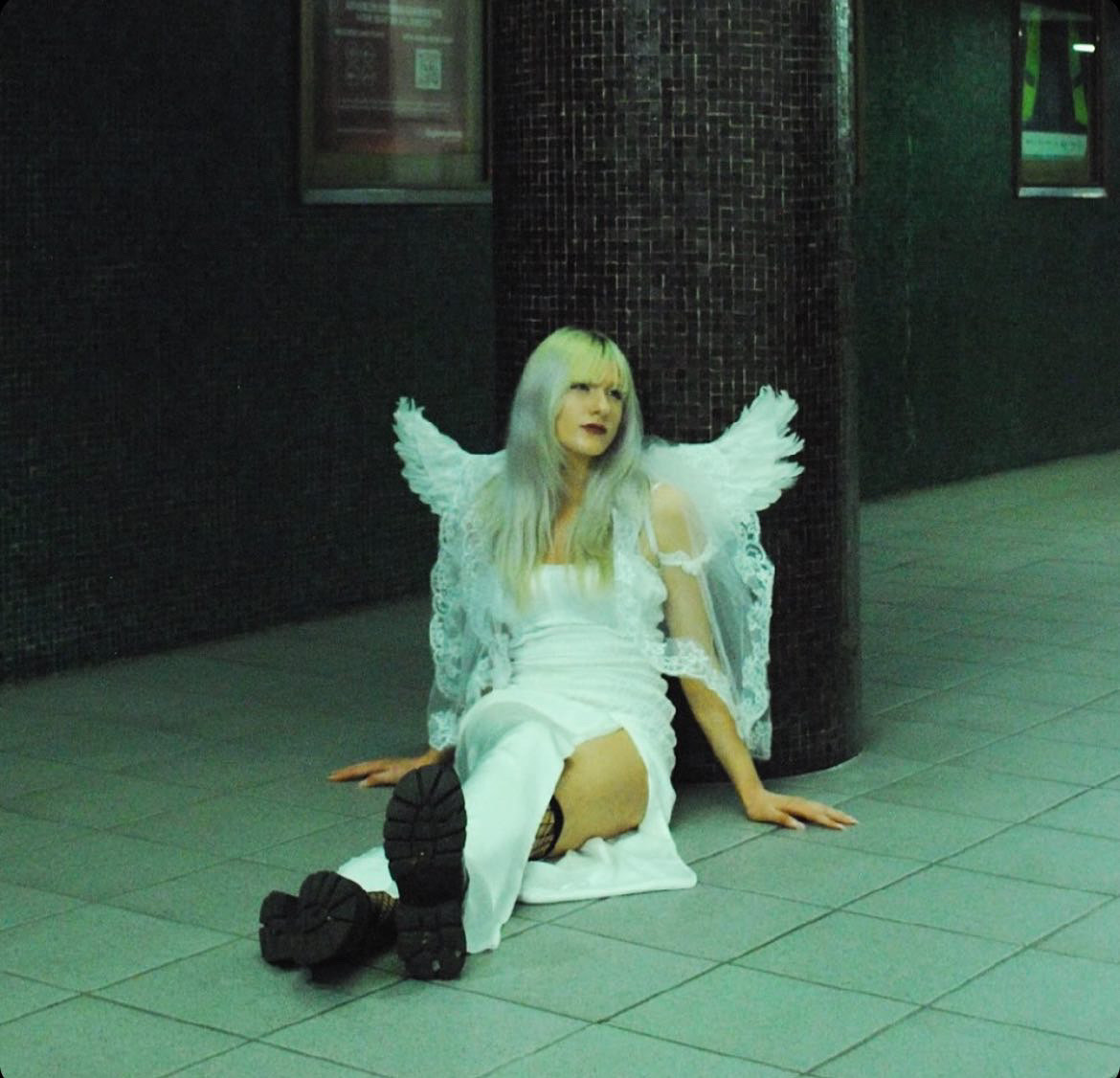The future musician Lucy Fitzgerald’s love for the medium didn’t come from her non-musically-inclined household in the border town of Athlone. Instead, her earliest memories of music were when her primary school teachers picked her to sing in their choir and she instantly fell in love.
However, Lucy found the town to be very unaccommodating to music, especially for younger fans. “Honestly, in Athlone, there is not much,” Lucy tells Post-Burnout. “I used to do singing competitions and stuff like that. They would be around Ireland. That was, for me, the scope I could do, at the time.”
As she grew, Lucy gravitated towards honest performers and storytellers. “I really found a passion in it when I started actually writing music and making music,” she says. “I would say my biggest inspirations, musically and lyrically, would be SZA and Amy Winehouse. […] I love vulnerability in music, so I like how honest they would be in those genres and how they would express themselves.”
She adds, “With music, I listen to all kinds of music because, even if I do just make R&B and hip-hop, I feel like you can pick up something from anywhere, you know what I mean? And just fuse it with something and make it with something. There’s no limits, and I don’t like being limited when I make music; I like trying new things and seeing what I can do with it.”
As a teen, Lucy began casting some original music but, looking back, she feels that what she was doing at this time was not really true to her interests. “I first started writing slower, indie rock songs on my guitar,” she says. “Because that’s what you do – because I was writing songs at the same time that I was learning guitar – and that was just kind of the songs that you played on that.”
“When I went to college, most of the scene [was] kind of indie rock, but I really felt like it was not my thing. Like, I enjoyed it, but just for me, as an artist, I was kind of like, ‘This isn’t the type of music I feel like I’m supposed to be making.’”
At age nineteen, Lucy moved to Dublin to study Vocals at BIMM. At her audition, she performed “Will You Still Love Me Tomorrow” by The Shirelles (in the style of Amy Winehouse’s cover) and “She Used to Be Mine” by Sara Bareilles, written for the musical Waitress.
“I would have still been in secondary school when I was auditioning at BIMM,” Lucy remembers. “And this was a time when I was doing singing competitions, as well. I have a very different view, now, on performing than I did, then. I was in the position where I was always competing when I was performing, you know? It was always a really anxious-, anxiety-driven thing. […]
“I used to be so, so anxious. […] When I started making original music was when I started loving gigging because it became such a different thing. It became rather than me competing, it was me expressing myself, which is a completely different thing. Rather than comparing yourself to other people, you’re kind of more focused on connecting with people. It’s very, very different. I’m in a very different headspace about performing and anything like that than I [was], before.”

Courtesy of Lucy Fitzgerald
Now living in Dublin, which had a comparatively multifaceted music scene to Athlone, and old enough to attend every gig, Lucy was drawn to the live options available on any given night, and attending shows and speaking with musicians further expanded her provinces.
“I feel like I’m growing so much, so rapidly, because I take everything in,” Lucy says. “Like, everything that I see and different genres and stuff. I love the Dublin music scene. I wish there was a little bit more of a variety in it, but I love it. Especially in BIMM, right now, there’s some great artists broadening genres and stuff like that.”
With these new opportunities for connections and networking, Lucy began the self-described “indie soul-pop” project Retrograde, whose debut single, “Goodbye Boy,” did numbers on streaming platforms when it was released in February.
For the first time, it seemed like Lucy was finally making the kind of music she always wanted to make. She explains, “When I made the band Retrograde, and I started working with instrumentalists and taking on the role of more of a director, I was able to make R&B songs, and more reggae songs, and funk songs, and I was like, ‘OK, this is way more my avenue.’”
She adds, “That was my first project. As I said, I just wrote songs on my guitar, before, and Retrograde was the next step for me, in terms of finding music. Which I’m still in, but it’s definitely more of a collaborative project, now. I remember I met Niall [Dowling], my friend who plays guitar, and, at the time, I was kind of like, ‘I think I want to go in the jazz direction.’
“I was trying to find jazz guitarists, or R&B, anybody, and everybody was indie rock, or rock, or metal. Like, I could not find anybody! I was searching for so long! I asked everybody, and, like, nobody! And then, my friend Sophie in my class, she was like, ‘Do you know who you should meet? You should meet Niall. He’s a jazz guitarist.’
“And it was so funny, because when we met each other, we were like, ‘Do you know how long I’ve been looking for somebody who plays this genre? Like, nobody plays this genre!’ So, I met him and we were immediately like, ‘OK, let’s form a band.’ Like, we met each other. And then we picked all the other members. They’re all in our year. So, we all went to college together.”
While Retrograde has been enjoying success in the local scene, Lucy still had further aspirations she wished to explore. Growing up, she wrote prose and poetry and wanted to test and expand her metrical writing and her other auditory interests, specifically those in electronic instrumentation.
“The thing about Retrograde is, it’s a lot about the instrumental,” Lucy says. “It used to be a bit different, because, obviously, me and Niall started the band, so it used to be a lot of me and him, working together, and them the band would form around that.
“But, now, the band will form an instrumentation, and, obviously, I’ll be like, ‘Can we do this with dynamics and change certain stuff?’, but, usually, it’s me, working with an instrumental. So, usually, what I would do is, I would write the melody first and then write the words over that. For Retrograde, it’s very much a catchy game. Like, I’m writing what’s catchy.”
To explore her capabilities beyond the established parameters of Retrograde, Lucy began a solo venture, which she dubbed LUCYY. “Kind of in the [same] way that I wrote songs for guitar and I was like, ‘That wasn’t for me,’ when I wrote songs for Retrograde, I was like, ‘This is way more me. This is me. This is what I want to go about,’ but it was also a collaborative project, so, yes, it’s me, but what’s ‘me’ me?”, says Lucy of conceptualising LUCYY.
“Retrograde taught me a lot about what I would like to do if I went solo, but it was also like, I didn’t want to leave Retrograde and just – what? – make another Retrograde? [Laughs] I had to be like, ‘What am I actually going to do on my own?’
“And when I started working with beats and hip-hop and R&B, it gave me a lot more freedom, in terms of my writing. Because, as I said, when you have to work, writing over melodies, I love it and I can do it, but it’s kind of a thing for Retrograde because there’s only so much I can say, to fit into this.
“And the thing about my solo music is, especially working with melodic rap, […] it really gives me room for a lot of my writing. Even ‘WHAT WE DO’ is such a story-driven song, and it very much distinguishes itself from what I’m doing with Retrograde, you know? Because I think that was a big thing, was people thinking, ‘Oh, is it just going to be Retrograde 2.0?’, and it’s like, ‘No! It’s very different music. I’m going about it very differently.’”
Released on August 15th, LUCYY’s debut single is “WHAT WE DO,” a collaboration between herself and producer, musician, and friend Joshua Tuite. On the track, Lucy’s vocals are pushed to the forefront as she directly and unapologetically admonishes a manipulative ex as the accompanying instrumentation aids her indignant and sincere delivery whilst understanding that the words are paramount and, as such, does not overshadow them.
“It was a very rough time in my life, I guess, and I was writing about the push and pull of a toxic relationship that I was in at the time, and I think I wrapped up a lot of self-worth into it,” Lucy explains of the background of the single. “When I was making the song, and I was kind of just experimenting, I was going through that.
“And, as I was writing the song, it was a bit of a wake-up call for me. Like, the first two verses are kind of the push and pull of me being in that relationship, and what I love about the bridge, is me coming to the realisation. My life got a lot better afterwards but I kind of wrote it as, ‘Oh, I’m not there, yet, but I will be. I will be,’ and I wrote it from that perspective for the bridge.
“It all kind of comes full circle at the end. At the start, I write, ‘No, they don’t see how you really treated me, so I’m back to the beats. Can’t kick out a man I don’t need,’ and I do the whole storyline, and then it comes back to that. It was very healing for me to write, and it felt like the best single I could have released first.
“I think I have other songs – like, the next one I’m looking to release is a lot more short and catchy – but this one shows a lot of different things in it. I’m happy with how my voice sounds. I think the choruses are still keeping that catchiness that people liked from Retrograde, but telling a story and, also, in the song, I’m going my own way and figuring it out, so it felt nice for that to be the first song.”
LUCYY’s debut single, “WHAT WE DO,” is now available on all streaming platforms. You can keep up with LUCYY through her Linktree.
Tune into POSTBURNOUT.COM Interviews… tonight at 21:00 (IST) to hear this interview in full, where we go into further depth about everything discussed and much more. Available on YouTube, Spotify, Apple Podcasts, and Amazon Music Podcasts.

Aaron Kavanagh is the Founder and Editor-in-Chief of Post-Burnout. His writing can also be found in the Irish Daily Star, Buzz.ie, Totally Dublin, The GOO, Headstuff, New Noise Magazine, XS Noize, DSCVRD and more.

 POST-BURNOUT
POST-BURNOUT